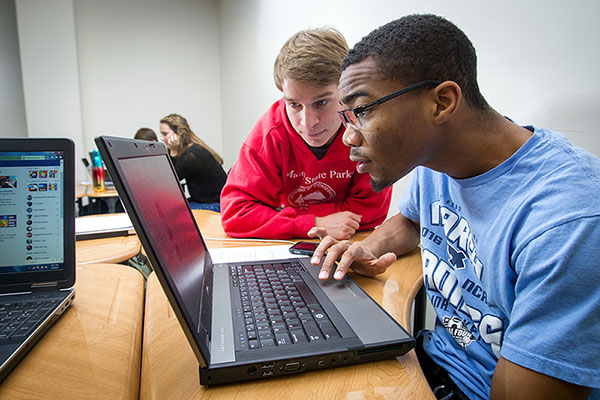The Scholars with Diverse Abilities Program (SDAP) is a grant-funded program that provides students with mild to moderate intellectual disabilities – known as SDAP Scholars – access to a two-year, inclusive college educational experience at Appalachian State University.
In this video, two SDAP Scholars share what the Appalachian Experience means to them.
Many Appalachian students benefit from having peers with intellectual challenges on campus
About Appalachian State University
As a premier public institution, Appalachian State University prepares students to lead purposeful lives. App State is one of 17 campuses in the University of North Carolina System, with a national reputation for innovative teaching and opening access to a high-quality, cost-effective education. The university enrolls more than 21,000 students, has a low student-to-faculty ratio and offers more than 150 undergraduate and 80 graduate majors at its Boone and Hickory campuses and through App State Online. Learn more at https://www.appstate.edu.
Transcript
Anna Ward: So, the Scholars with Diverse Abilities Program, otherwise known as SDAP, is a program set up for people with intellectual disabilities. They come to the university for two years and it’s inclusive. These students have challenges in areas of academics and in areas…sometimes of social skills, or things that a lot of us take for granted in terms of day-to-day routine. So, I’d say what we really want for our students, the over-arching goal, is that they develop skills in self-advocacy and self-determination, so that when they finish they are able to communicate about themselves, talk about what they’re good at, and where they have challenges, and feel okay doing that. And then to learn how to make their own decisions, appropriate decisions, that will lead them to a more independent life. So, students with intellectual disabilities, or any disability, tend to be very reliant on their families and the families are strong advocates for them. We hear a lot of families who after high school they’re thinking, ‘Wow! What’s going to happen to my child?’ So when families come to us, they’re really seeking a way for their children to transition into a better life.
Victoria Hall:Before I came to SDAP it was really hard, but then I started loving it because I love to come here for school.
Louise Hall: Well, I think she wants her independence. She would like to learn the skills, so that she can go out and get a job. She’s very social, she likes people. She wants to meet more people and do different things with them. So this way she can broaden her interests just like any other freshman that comes to college, so that she’ll learn things that she may want to do in her life that thus far she hasn’t thought of.
VH:At first, I was a bit nervous. But then I met some old friends, so I started hanging out with them. They’re cool and funny; they make me laugh. When they see me, they call me Queen Victoria.
Robert Evans: I think the first day Robert I was shy; I wasn’t very open to people. Robert today, I’m just being myself and telling it how it is.
Delphine Anderson: Robert hopes to learn, here at Appalachian, more than anything how to survive in the real world. This should teach him how to get along with people, how to meet different people, how to interact with different people, because he has a nice personality, he’s a good person, he’s a learner, he wants to learn.
RE: Well, I think my momma is very glad that I went to college and get to experience the college life and meet different people and make friends.
DA: You know, he doesn’t want to be known as being different. He wants the same opportunities as everybody else, but he doesn’t want anything given to him. It gives them a goal that, ‘I can do this. If I work hard, I can be just like her. If that’s what I want, that means I’ve got to work twice as hard and I can do it.’ That’s why I think this program, the way it’s set up, it’s going to give them hope and that’s what everybody needs to be a better person.
AW: The student supports that are volunteers come in huge numbers, and we have over a hundred and if we break that down on a weekly basis, there are up to ten people working with each individual in the program per week.
Miriam Stapp: The volunteers that work with SDAP…I’ve been amazed to see how many there are on campus. So many students want to get involved, want to help, want to learn, want to be friends with the scholars in the program. They could be walking a scholar to a class to show them where the classroom is, it could be meeting them for lunch, just hanging out, talking, being friends really.
RE: I always have a volunteer, or someone to come with me to take notes or if I need other help in the classroom I’ve always got somebody in class to help me.
MS: Appalachian talks about diversity a lot, as do many college campuses. We can learn about disability rights, minority rights, all the different aspects there are to diversity. You can learn about them all day in a class room, but to truly understand the importance of diversity you have to have relationships with people who belong to those minorities. SDAP strives really hard to integrate community into the scholars lives, and I think the scholars and the other students of Appalachian both benefit a lot from that.
RE: Well, I’d like to thank my momma and I’d like to give a big thank you to the SDAP staff to give me the opportunity to have the college experience.
What do you think?
Share your feedback on this story.





![How NCInnovation Is Rethinking Economic Development in North Carolina [faculty featured]](/_images/_posts/2026/02/rethinking-economic-development-600x400.jpg)






